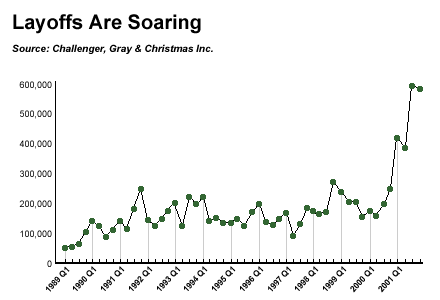Not so long ago, it seems, there was a shortage of workers. Jobs were easy to get. Employers were doing everything they could to keep their current workers and hire new ones. All that has changed over the past year to 18 months. And since the Sept. 11 terrorist attacks, the rising number of layoffs has soared to record levels (see data from the Bureau of Labor Statistics, right column). Unfortunately, the layoff pattern of late 2001 seems to be continuing in early 2002, as some major U.S. companies announce new layoff and restructuring plans while others appear to be crumbling.
Given this economic environment, it should not be surprising that the American public is not optimistic about the job outlook. While consumer expectations about a near-term economic recovery are soaring -- according to both Gallup's measures and the University of Michigan's Consumer Sentiment Survey -- most Americans who are employed or looking for work see the job situation as dismal. According to a Jan. 7-9, 2002 Gallup economic poll*, fewer than one out of four Americans (24%) thinks that now is a good time to find a job. This is about the same percentage that felt this way throughout the fourth quarter of 2001. More importantly, it is a complete turnaround from a poll taken about 18 months ago (in August 2000) when more than three out of four Americans (78%) said it was a good time to find a job. Further, nearly half (46%) of the public expects the current level of unemployment to increase over the next six months.

Significantly, the poor job outlook is evenly felt across the American public. To the degree that differences exist, they are as expected. Men (31%) are somewhat more likely to say it is a good time to find a job than are women (22%). Younger men (31%) and younger women (22%) are somewhat more likely to say it is a good time to find a job than are older (50+) men (23%) and older (50+) women (17%). Postgraduates are slightly less likely to say it is a good time to look for a job than are other Americans.
Ignoring the Job Outlook Is Risky
Economists will say that the job situation is a lagging economic indicator. And since the Sept. 11 terrorist attacks, the rising number of layoffs has soared to record levels. The problem is that the current recession was not consumer-led. And it is not clear that the impact on the consumer of the deteriorating job situation and the fears it can create has been felt by the economy. If the economy doesn't start recovering as soon as expected, then current consumer optimism could crumble and the current recession could turn into something much worse.
Later this month, the Federal Reserve meets to consider interest rates. Given Fed Chairman Alan Greenspan's recent speech in San Francisco, it is likely that the Fed will lower interest rates -- at least modestly. Congress reconvenes Jan. 23, but it is far from clear that it will act to stimulate the economy.
Key Points
In December, a strong majority of Americans (84%) told Gallup that they think that Congress and the president can improve the economy "a great deal" or "a fair amount" by their actions. In January, 41% of Americans said that most of the money in a stimulus package should be used for tax cuts, and 46% said that most of the stimulus should be added spending. Regardless of the form the stimulus package takes, the current job situation indicates that a fiscal stimulus is not only necessary, but also prudent. If policy-makers ignore the need for stimulus early this year, then they may well be placing their own jobs at risk in November.
*Results are based on telephone interviews with 1,015 adults, aged 18+, conducted Jan. 7-9, 2002. For results based on this sample, one can say with 95% confidence that the margin of sampling error is ±3 percentage points.
